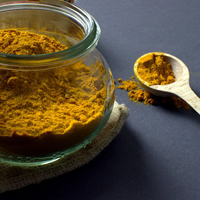Antitumoral activity of curcumin: an adjuvant therapeutic strategy

Submitted: April 27, 2019
Accepted: November 28, 2019
Published: January 21, 2021
Accepted: November 28, 2019
Abstract Views: 533
PDF: 288
Publisher's note
All claims expressed in this article are solely those of the authors and do not necessarily represent those of their affiliated organizations, or those of the publisher, the editors and the reviewers. Any product that may be evaluated in this article or claim that may be made by its manufacturer is not guaranteed or endorsed by the publisher.
All claims expressed in this article are solely those of the authors and do not necessarily represent those of their affiliated organizations, or those of the publisher, the editors and the reviewers. Any product that may be evaluated in this article or claim that may be made by its manufacturer is not guaranteed or endorsed by the publisher.

 https://doi.org/10.4081/jbr.2020.8252
https://doi.org/10.4081/jbr.2020.8252



